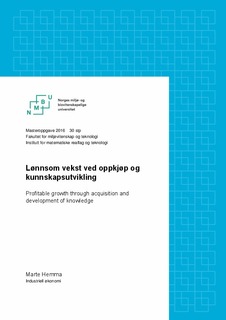Lønnsom vekst ved oppkjøp og kunnskapsutvikling
Master thesis
Permanent lenke
http://hdl.handle.net/11250/2426035Utgivelsesdato
2017-01-02Metadata
Vis full innførselSamlinger
- Master's theses (RealTek) [1722]
Sammendrag
Paradokset med samtidig samarbeid og konkurranse kalles samkonkurranse. Samkonkurranse kan skape problemer for kunnskapsutviklingen i bedrifter dersom den ikke håndteres riktig. Nettopp derfor er den et viktig element for at integrasjonsprosessen skal resultere i en lønnsom vekst for selskapene. Imidlertid har det vært lite forskning på fenomenet. Med bakgrunn i dette valgte jeg å undersøke problemstillingen: Hvordan bør ledelsesteam håndtere intra-organisatorisk samkonkurranse mellom det oppkjøpte selskapet og det overtakende selskapet for å øke kompetanseutviklingen for et firma i bygg- og anleggsbransjen?
Et teoribasert casestudium utgjør kjernen i arbeidet, hvor kvalitativ metode med dybdeintervjuer og fokusgrupper ble benyttet for å samle inn data. Caset som ble valgt var et oppkjøp Norges fjerde største entreprenør, NCC, gjorde i 2011 av en maskinentreprenør, Carl C Fon. Informantene bestod av fire representanter fra hver bedrift fra to nivåer i selskapene. Intervjuene ble utformet med bakgrunn i tre forskningsspørsmål for å kaste lys over problemstillingen:
1. Hva kjennetegner intra-organisatorisk samkonkurranse i integrasjonsprosessen?
2. Hvordan påvirker intra-organisatorisk samkonkurranse i integrasjonsprosessen kunnskapsutviklingen?
3. Hvilke tiltak kan ledelsesteam innføre for å sikre økt kunnskapsoverføring i integrasjonsprosessen som er preget av samkonkurranse?
Alle integrasjonsprosesser vil være unike, og resultatene fra mine undersøkelser gjelder derfor i hovedsak oppkjøp med liknende forutsetninger som i caset. For å sørge for en god balanse mellom samarbeid og konkurranse bør ledelsesteamet kartlegge i hvilken grad det opptrer underliggende konkurranse med bakgrunn i kulturforskjeller. Integrasjonsprosessen vil gjerne preges av mye underliggende konkurranse i den første fasen. Tillit er avgjørende for å kunne utnytte fordelene samkonkurransen potensielt kan gi. Ved å sørge for gode arenaer hvor partene kan utveksle og utvikle kompetanse, vil tilliten bygges opp så lenge begge parter unngår opportunistisk atferd. Når samkonkurransen fungerer optimalt med tillit mellom partene vil samarbeidet føre til at kunnskapen overføres, og sunn konkurranse gir insentiv til å utvikle ny kunnskap. Dette kan potensielt gi begge parter økte konkurransefordeler, som fører til en lønnsom vekst. The construction industry in Norway is facing increasingly larger and more complex projects that require more resources and expertise, project management and coordination of large projects. To meet these requirements, companies can acquire firms with the appropriate resources and / or new knowledge. Upon acquisition, competition and cooperation occur simultaneously in the integration process. The paradox of simultaneous cooperation and competition is called coopetition, where there is a research gap. Coopetition can create problems for the development of knowledge if not handled properly, and is therefore an important element of the integration process to result in a profitable growth for companies. Based on this, my main approach in this master thesis is to answer: How should management teams deal with intra-organizational coopetition between the acquired company and the acquiring company to increase knowledge development for a company in the construction industry?
A theory based case study constitutes the core of the work, where qualitative methods with in-depth interviews and focus groups were used to collect data. The case chosen was the acquisition made by Norway's fourth largest contractor, NCC, in 2011 of a plant contractor, Carl C Fon. The informants consisted of four representatives from each company from different levels in the organization structures. The interviews were designed on the basis of three research questions to shed light on the issue:
1. What characterizes intra-organizational coopetition in the integration process?
2. How does the intra-organizational coopetition in the integration process of knowledge development?
3. What steps can management team introduce to ensure greater transfer of knowledge in the integration process that is characterized by coopetition?
All integration processes are unique, and my results are primary applicable to acquisitions under similar conditions as in the case study. To ensure a proper balance between cooperation and competition, management teams should reduce the degree of underlying competition based on cultural differences. The integration process will most likely be characterized by considerable underlying competition in the first phase. Trust is essential for the advantages coopetition potentially could provide. By providing good venues where parties can exchange and develop expertise, trust will be built as long as both parties avoid opportunistic behavior. When coopetition is functioning optimal with trust between the parties, the cooperation will lead to knowledge transfer and constructive competition provide the incentive to develop new knowledge. This could potentially give both parties increased competitive advantages, leading to profitable growth.
